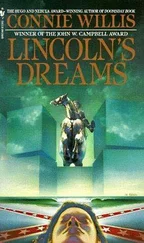The committee’s criteria were originality of thought and creativity, I thought. Assuming there is a committee.
“I haven’t completed the regressions yet, but some patterns are emerging.” She called up a spreadsheet. “The grant is given at a median interval of one point nine years apart, but the closest two grants have ever been given is one point two years, which means the grant won’t be given until May at the earliest.”
It didn’t mean any such thing, and I would have said so, but she was into it now.
“Distribution of the awards follows a cyclical pattern, with academic institutions, research labs, and commercial corporations alternating, the next one being a corporation, which gives us an advantage, and”— she switched to a different spreadsheet—“there is a definite bias toward scientists west of the Mississippi, which is also an advantage, and a bias toward the biological sciences. I haven’t determined the specific area yet, but I should have that part of the profile by tomorrow.”
All of which sounded suspiciously like science on demand. I looked at Bennett to see what he thought about all this, but he was watching the screen intently, abstractedly, as if he’d forgotten we were there.
Well, of course he was interested. Why wouldn’t he be? If he could win the Niebnitz Grant, he could go back to the Loue River to work on chaos theory and forget all about forms and Flip and the uncertainties of funding.
Except science doesn’t work like that. You can’t handicap significant breakthroughs like they were a horse race.
But this wouldn’t be the first time somebody’d convinced himself of something that wasn’t true where money was involved. Take the stock market fad of the late twenties. Or the Dutch tulip craze of the 1600s. In 1634, the prices of tulips that were fancier or prettier or rarer than others started going up, and suddenly everybody—merchants, princes, peasants, brothers, sisters, husbands, wives—was buying and selling bulbs like mad. Prices skyrocketed, speculators made fortunes overnight, and people hocked their wooden shoes and the dike to buy a bulb that might cost as much as twelve annual incomes. And then for no reason, the market collapsed, and it was just like October 29, 1929, only with no skyscraper windows for Dutch stockholders to fling themselves out of.
Not to mention chain letters, pyramid schemes, and the Florida land boom.
“The other factor that needs to be considered is the name of the grant,” Alicia was saying. “Niebnitz may refer either to Ludwig Niebnitz, who was an obscure eighteenth-century botanist, or to Karl Niebnitz von Drull, who lived in fifteenth-century Bavaria. If it’s Ludwig, that would account for the biological bias. Von Drull was more famous. His area was alchemy.”
“I have to go,” I said, standing up. “If I’m going to switch my fads project to changing lead into gold, I’ll need to get busy,” and I walked out.
Bennett followed me out into the hall. “Thanks for bringing the funding form.”
“We have to stick together against the forces of Flip,” I said. “Have you met her new assistant?”
“Yeah, she’s great,” he said. “I wonder whatever possessed her to take a job like this?”
“NIEBNITZ may also be an acronym,” Alicia said from the doorway. “In which case—”
I took my leave and went back up to my lab.
Flip was there, typing something on my computer. “How would you describe me?” she asked.
I looked around the lab. It was spotless. Shirl had cleaned off the lab tables and put all my clippings in folders. In alphabetical order.
Inescapable, I thought. Impacted. “Inextricable,” I said.
“That sounds good,” she said. “Does it have two k s or one?”
Dr. Spock [1945–65]
Child care fad, inspired by the pediatrician’s book, Baby and Child Care, growing interest in psychology, and the fragmentation of the extended family. Spock advocated a more permissive approach than previous child care books and advised flexibility in feeding schedules and attention to child development, advice which far too many parents misinterpreted as letting the child do whatever it wanted. Died out when the first generation of Dr. Spock-raised children became teenagers, grew their hair down to their shoulders, and began blowing up administration buildings.
Wednesday I went to the birthday party. I’d arranged to leave early and was putting on my coat when Flip slouched in, wearing a laced bodice and duct-tape-decorated jeans, and handed me a piece of paper.
“I don’t have time for any petitions,” I said.
“It’s not a petition,” she said, tossing her hair. “It’s a memo about the funding forms.”
The memo said the funding forms were due on the twenty-third, which I already knew.
“You’re supposed to turn the form in to me.”
I nodded and handed it back to her. “Take this down to Dr. O’Reilly’s lab,” I said, pulling on my gloves.
She sighed. “He’s never there. He’s always in Dr. Turnbull’s lab.”
“Then take it to Dr. Turnbull’s lab.”
“They’re always together. He’s com plete ly raved about her, you know.”
No, I thought, I didn’t know that.
“They’re always sitting at the computer together. I don’t know what she sees in him. He’s com plete ly swarb,” Flip said, picking at the duct tape on the back of her hand. “Maybe she can make him not so fashion-impaired.”
And if she does, I thought irritatedly, there goes his nonfadness, and I’ll never figure out why he was immune to them.
“What does sophisticated mean?” Flip asked.
“Cosmopolitan,” I said, “but you’re not,” and left for the party. The weather had turned colder. We usually get one big snowstorm in October, and it looked like the weather was gearing up for it.
Gina was nearly hysterical by the time I got there. “You won’t believe what Brittany decided she wanted after I said she couldn’t have Barney,” she said, pointing to the decorations, which were a pink that bore no relation to postmodern.
“Barbie!” Brittany shouted. She was wearing a Little Mermaid dress and bright pink hair wraps. “Did you bring me a present?”
The other little girls were all wearing Pocahontas pinafores except for a sweet little blonde named Peyton, who was wearing a Lion King jumper and light-up sneakers.
“Are you married?” Peyton’s mother said to me.
“No,” I said.
She shook her head. “So many guys have intimacy issues these days. Peyton, we’re not opening presents yet.”
“Are you dating anyone?” Lindsay’s mother said.
“We’re going to open presents later, Brittany,” Gina said. “First we’re all going to play a game. Bethany, it’s Brittany’s birthday.”
She attempted a game involving balloons with pink Barbies on them and then gave up and let Brittany open her presents.
“Open Sandy’s first,” Gina said, handing her the book. “No, Caitlin, these are Brittany’s presents.”
Brittany ripped the paper off Toads and Diamonds and looked at it blankly.
“That was my favorite fairy tale when I was little,” I said. “It’s about a girl who meets a good fairy, only she doesn’t know it because the fairy’s in disguise—” but Brittany had already tossed it aside and was ripping open a Barbie doll in a glittery dress.
“Totally Hair Barbie!” she shrieked.
“Mine,” Peyton said, and made a grab that left Brittany holding nothing but Barbie’s arm.
“She broke Totally Hair Barbie!” Brittany wailed.
Peyton’s mother stood up and said calmly, “Peyton, I think you need a time-out.”
Читать дальше












